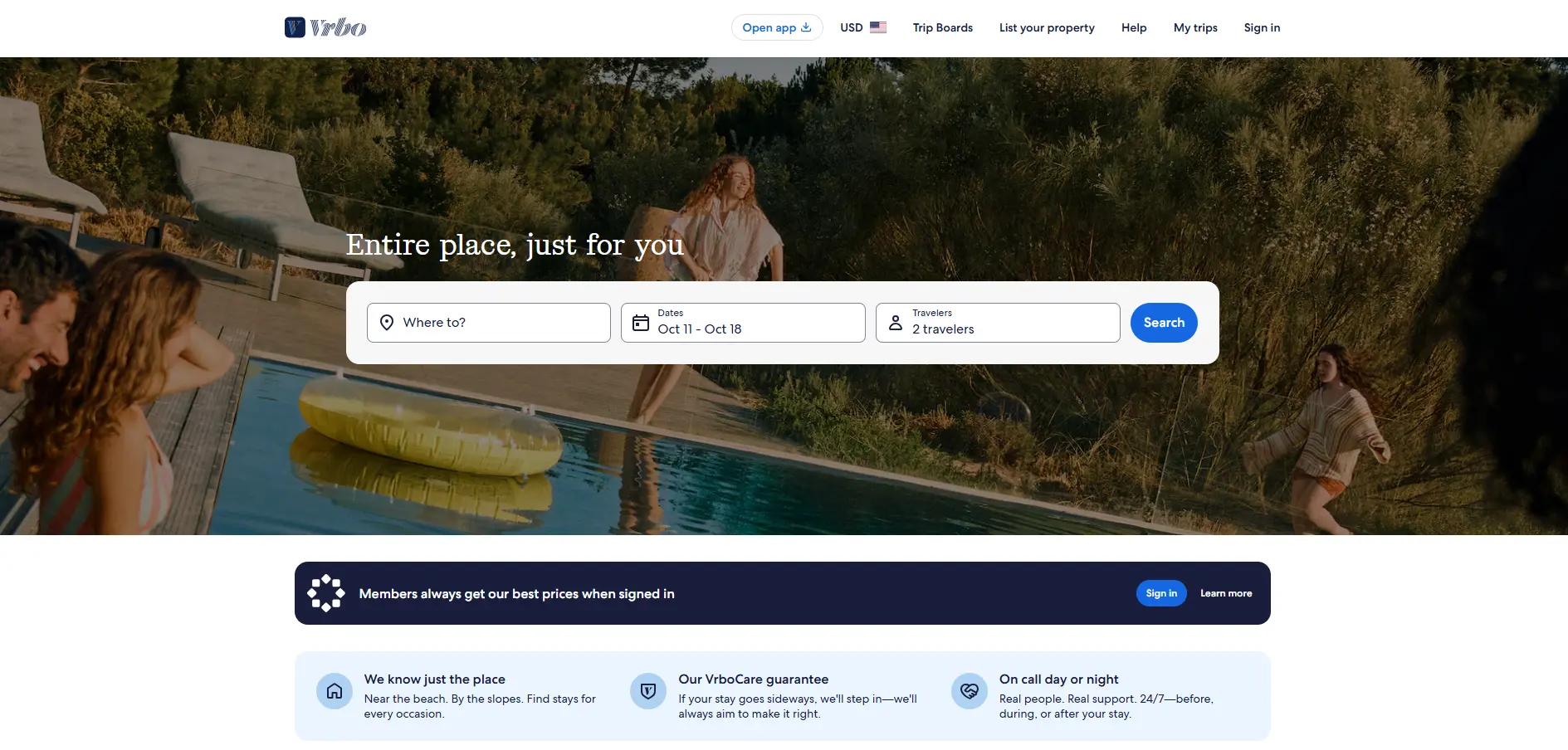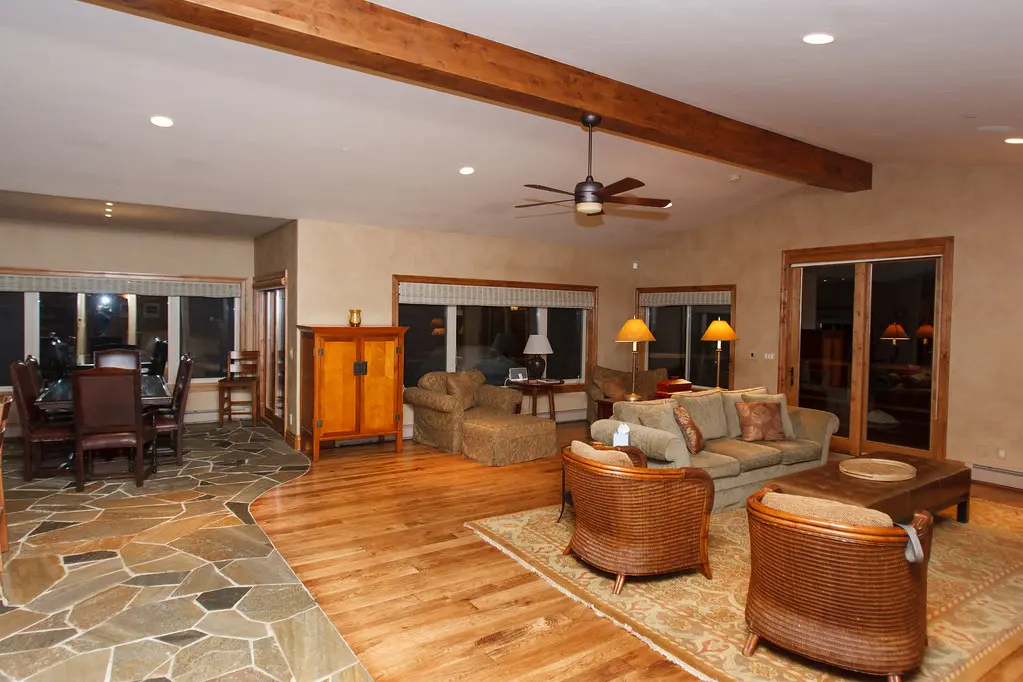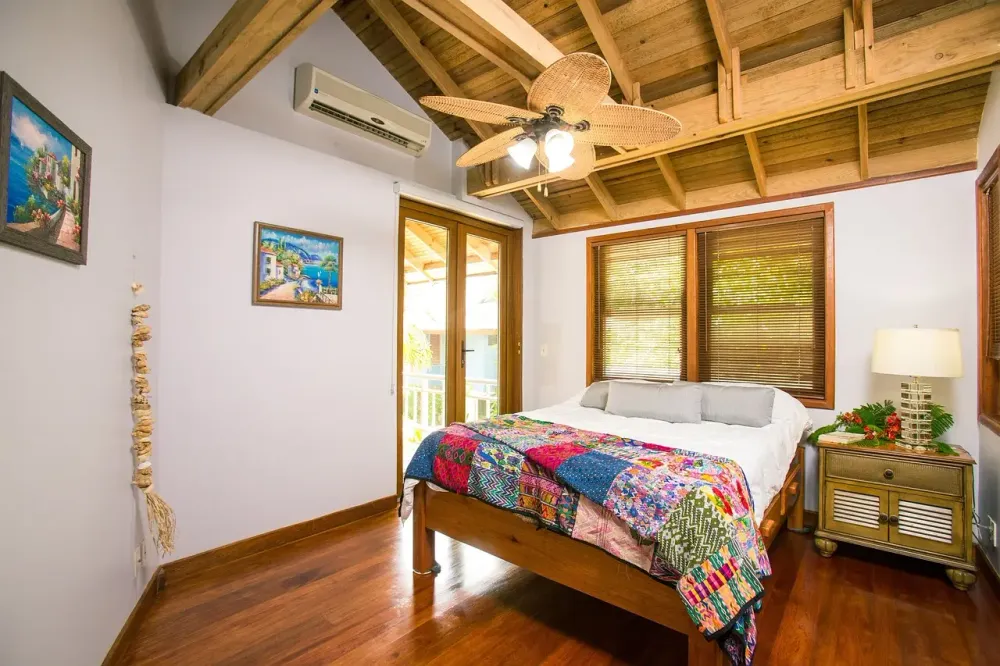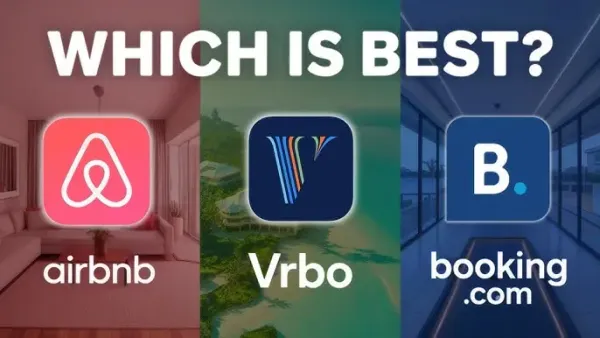How Vrbo Is Moving Into the Hotel Space — And Where It’s Cheapest
For years, Vrbo has been synonymous with vacation rentals. If you wanted an entire beach house in Florida, a ski chalet in Colorado, or a family-sized villa in Tuscany, Vrbo was one of the first platforms you checked. Unlike its rivals, it deliberately stayed away from hotels, carving out a niche as the place for whole-home rentals. That clear focus helped Vrbo grow into a global player, now offering more than two million properties worldwide under Expedia Group.
But the lines between rentals and hotels are starting to blur. In 2025, Vrbo is quietly testing hotel inventory within its platform, leveraging Expedia’s massive hotel supply. The move signals a strategic shift: Vrbo no longer wants to limit itself to long stays and family groups. Instead, it’s courting short-stay travelers and competing directly with Booking.com, Trip.com, and Airbnb — platforms that already mix hotels with alternative stays.

For travelers, this shift could mean unexpected opportunities. In some destinations, Vrbo shows cheap hotels, often cheaper than on rival online travel agency companies, while in others, the savings aren’t as clear. This article explores how Vrbo is stepping into hotel territory, why it matters, and where you might find the lowest Vrbo hotel deals.
Vrbo’s Origins and Core Identity
Vrbo’s story begins in 1995 in Colorado, when it launched as Vacation Rentals by Owner — a simple listing site where homeowners could advertise their second homes directly to travelers. At the time, the concept of renting an entire property for a vacation was relatively niche, largely limited to ski towns, beach communities, and family reunion trips. Vrbo filled a clear gap in the market by connecting owners with families who wanted space, kitchens, and privacy that hotels rarely provided.
Through the early 2000s, Vrbo grew steadily, particularly in the United States, as more travelers sought alternatives to hotels for longer stays. Its model was subscription-based: owners paid to list their property, and guests dealt with them directly. By 2006, Vrbo had become large enough to attract HomeAway, another vacation rental marketplace, which acquired it to build scale.

The real turning point came in 2015, when Expedia Group acquired HomeAway (and Vrbo along with it) for $3.9 billion. Over the next few years, Expedia shifted Vrbo to a commission-based model, improved global visibility, and invested in rebranding (changing the pronunciation to “Ver-boh” in 2019).
Why Vrbo is Expanding Into Hotels
Vrbo’s success has always rested on its clear identity: whole homes for families and groups. But by 2025, consumer travel behavior has shifted in ways that challenge that narrow focus. Shorter stays are on the rise, solo and couple travel continues to grow, and many travelers want the convenience of browsing both rentals and hotels in one place. To remain competitive, Vrbo is expanding into hotel inventory — a move made possible by its parent company, Expedia Group, which already manages a massive hotel supply of more than 3 million listings globally.
This strategy is less about abandoning Vrbo’s rental roots and more about broadening its appeal. By adding hotels, Vrbo can capture travelers who may not need an entire property — think business travelers in New York for three nights, or couples booking a weekend getaway in Paris. It also allows Vrbo to cross-sell stays, target last-minute bookers, and keep users within its ecosystem instead of losing them to Booking.com or Trip.com.
Competitors have blurred these lines for years: Airbnb lists boutique hotels, while Booking.com thrives on a hybrid model. Vrbo’s hotel expansion is essentially catch-up — but if executed well, it could unlock an entirely new customer segment.
How Vrbo Displays Hotels
For longtime Vrbo users, the introduction of hotels is subtle but noticeable. Traditionally, Vrbo’s search results were dominated by vacation homes, cabins, and condos. Now, in certain markets, hotels are appearing side by side with those rentals. This integration is powered by Expedia Group’s vast hotel network, meaning many of the same properties visible on Expedia or Hotels.com can also appear on Vrbo.
Vrbo doesn’t heavily market these listings as “hotels” in the same way Booking.com does. Instead, they are woven into search results, often tagged with details like “standard room” or “queen suite,” giving them the same presentation style as rental properties.
So if you are searching for hotels near San Antonio or hotels near Charlotte, you are not likely to get a result.
Pricing follows Vrbo’s standard model: nightly rates with service fees added at checkout. For users accustomed to comparing whole homes, this can be jarring, but it also opens up more options, especially for short stays.
One challenge is transparency. Vrbo’s platform was built for families booking weeks at a time, not business travelers booking two nights. Cleaning fees, service charges, and cancellation policies can make hotel pricing less straightforward than on competitors’ sites. Still, in test markets such as Orlando, Cancún, and Las Vegas, Vrbo’s hotel listings have shown competitive rates, especially when bundled with longer rental searches.
Where Vrbo Hotels are Cheapest
In some markets, hotels listed via Vrbo (through its integration with Expedia) actually come out cheaper than on competing OTAs. Below are example destinations and strategies where you’re more likely to see those savings — though your mileage may vary.
| Destination | Why Vrbo might be cheaper | Sample comparison notes / caveats |
|---|---|---|
| Orlando, Florida (U.S.) | High hotel density + heavy Expedia inventory means overlap. Vrbo may show hotels under the same inventory but with different fee structures. | Use Vrbo’s filters (e.g. “hotel / standard room” tags) and compare with identical hotel on Booking.com / Expedia. |
| Las Vegas, Nevada | Massive lodging stock, many hotel chains list via multiple OTAs. Vrbo’s integration sometimes surfaces deals with lower service fees. | Check “last-minute” discounts on Vrbo, then compare net nightly cost after all fees. |
| Cancún, Mexico / Riviera Maya | Resort-heavy region with hotels already in vacation rental ecosystems; Vrbo may get “hybrid” listings (hotel + resort) at competitive rates. | Watch out for resort fees and “all inclusive” add-ons. Make sure the same inclusions are compared. |
| Lisbon / Porto, Portugal | Boutique hotels and guesthouses tend to list in multiple channels; Vrbo sometimes surfaces them at minimal premium. | Use Vrbo’s “homes & apartments” filter and look for “standard room” subcategory. |
| Secondary U.S. / Latin cities (e.g. Phoenix, San Juan) | Less OTA competition means Vrbo’s interoperability with Expedia can produce cleaner pricing. | Smaller markets often show less arbitrage across OTAs. |
Tips to find the cheapest Vrbo hotel deal
- Enable “hotel / standard room” or “type = hotel” filtering when searching on Vrbo (if available).
- Apply “last-minute” or “discounts” filters — Vrbo often pushes deals for stays booked within 30 days
- Compare total all-in cost (room + taxes + service fees + cleaning) across Vrbo, Booking.com, and Expedia.
- Watch for new-listing discounts on Vrbo — sometimes early-list hotels or reopening properties offer promotional rates.
- Time your search — off-peak times (shoulder season, weekdays) increase the chances Vrbo hotels will undercut rivals.
In many cases, the difference is narrow, but in high-supply hotel places like Orlando, Las Vegas, or even hotels near Cancún, Vrbo may occasionally undercut Booking.com or Expedia — especially when host/hotel incentives or lower service margins are passed to the traveler.
Strengths & Weaknesses of Vrbo’s Hotel Push
Vrbo’s gradual expansion into hotels brings both opportunities and risks. On the strength side, the move instantly expands Vrbo’s inventory by tapping into Expedia Group’s massive hotel supply of more than 3 million listings worldwide. This allows Vrbo to compete more directly with Booking.com and Trip.com, both of which have long blurred the line between hotels and rentals.
But weaknesses remain. Vrbo’s brand identity has always been built on whole-home rentals, and introducing hotels risks confusing that message. Some long-time users may be put off by the clutter, especially if hotels begin to crowd out vacation rentals in search results. Pricing transparency is another issue: For instance, when you try to evaluate Vrbo on San Antonio hotels, its fee structure, originally designed for rentals, can make the hotel costs look less straightforward than on Booking.com or Expedia. Finally, Vrbo is late to this game. Airbnb, Booking, and Trip.com already integrate hotels seamlessly, meaning Vrbo must work harder to differentiate its offering.
Vrbo vs. Karta
| Criteria | Vrbo | Karta |
|---|---|---|
| Core Focus | Whole-home vacation rentals, with over 2M properties worldwide. | Vacation rentals + apartments, ~1.5–2M properties, designed around affordability and flexibility. |
| Pricing | Service fee (6–12%) plus cleaning charges; can be higher in short stays. | Lowest-price USP — app discounts, no big guest fees, and “Switches” feature to cut overall stay cost. |
| Target Audience | Families and groups booking longer vacations (7+ nights). | Budget-savvy travelers, digital nomads, and flexible stay planners — wider appeal beyond just families. |
| Innovation | Trip Boards for group decision-making. | Switches = unique split-stay model; gamified in-app deals; mobile-first design. |
| Strengths | Strong trust, backed by Expedia Group; decades of brand history. | New and agile: simpler UX, sharper discounts, and a clear value positioning that directly appeals to cost-conscious travelers. |
| Weaknesses | Higher fees, less flexible for short trips; less appeal for budget or solo travelers. | Lower brand recognition, smaller marketing footprint; still scaling trust and reviews. |
Conclusion
Vrbo has earned its place as one of the most trusted names in vacation rentals. With nearly three decades of history, strong backing from Expedia Group, and a focus on entire homes, it remains a reliable choice for families and groups who want privacy and space. Its longevity and scale are undeniable strengths.
Yet the travel landscape nowadays isn’t the same as it was when Vrbo was born. Travelers are no longer just booking one-week villa stays; they’re looking for flexibility, affordability, and seamless digital experiences.
This is where Karta shows its edge. With around 2 million listings worldwide, its lowest-price promise, app-exclusive deals, and innovative “Switches” split-stay model, Karta is better aligned with today’s traveler who might mix work and leisure, switch destinations mid-trip, or hunt for the absolute best deal on the go.
Karta may not yet match Vrbo’s brand recognition, but it doesn’t have to. By leaning into affordability and tech-driven features, it offers a fresher, more adaptable experience.
For travelers comparing platforms in 2025, the decision is simple: Vrbo is a solid legacy choice, but Karta is the smarter pick for those who want to save more and stay flexible.





